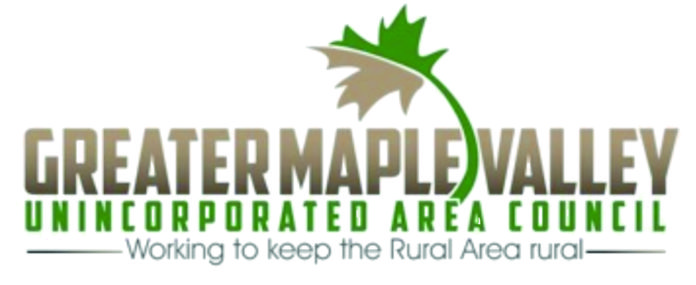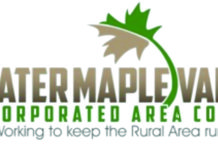On Monday, February 6, the Area Council held its monthly meeting at the King County Sheriff’s Precinct #3 at 22300 SE 231st St in Maple Valley and online via Zoom. Our Guest Speakers were from the King County (KC) Department of Natural Resources and Parks (DNRP) Solid Waste Division (SWD): Director, Pat McLaughlin and Recycling & Environmental Services Section Interim Manager, Andy Smith and Project Manager, Eliza Kruszynski.
KC Solid Waste Division
Cedar Hills Regional Landfill (CHRLF)
Division Director, Pat McLaughlin, stated the CHRLF has been around since the 1960’s—and its expected operational life all depends on existing capacity and the amount of materials taken in each year. Consequently, the County is focusing on both Prevention and Recycling to take advantage of the most significant opportunities they have ever had to divert materials from the CHRLF.
They estimate ~70% of the materials that go to the CHRLF do not belong there. They estimate each day there are ~100 trucks filled with what can be recycled, but instead is being buried. The County wants to divert these materials from the CHRLF, put them to a much better beneficial use, as well as have more people use yard waste services for compostables. Besides the environmental benefits, there are financial benefits that come with such diversion, which could be very good for this local community as well. Please visit: https://kingcounty.gov/depts/dnrp/solid-waste/garbage-recycling.aspx for more information.
Mr. McLaughlin welcomes the opportunity to return at a future meeting to discuss specific questions on local impacts of the CHRLF. The Area Council will arrange for that later this year.
Recycling
Recycling & Environmental Services Section Interim Manager, Andy Smith, discussed the recycling efforts in place and improvements being implemented. Mr. Smith stated KC’s mission is to reduce and reuse and recycle. It has several programs in place to improve recycling rates and keep more contamination out of what is placed in recycling bins. KC County Code states under Title 10.14.020 County goals—It is King County’s goal to achieve zero waste of resources by 2030 through maximum feasible and cost-effective prevention, reuse and reduction of solid wastes going into its landfills and other processing facilities. Mr. Smith described several programs KC has initiated:
Re+ Program—Reducing, Reusing, Recycling, Renewing, and Rethinking. A call to action based on a variety of KC plans including the Comprehensive Solid Waste Management Plan. Please visit: https://kingcounty.gov/re-plus.
Circular economy. We need better product design and producer responsibility to pay for recycling. We need more reuse as we work towards Zero Waste of resources by 2030. Achieving Zero Waste would result in 450,000 tones of less waste; 1 million more trees; recovered food for 92,000 people; more than 500 green job created; $24 million of future disposal costs avoided; and 150,000 fewer barrels of oil burned. Although KC has a 54% recycling rate, this has plateaued in the last 10 years and we still see much food thrown away, as well as food scraps still not being composed. KC has established a $2+ million Circular Economy competitive grant program that is open to private, non-profit and public entities to support waste prevention and waste diversion.
Next Cycle WA. This is a program to support businesses, community-based organizations, and individuals working to expand the circular economy. It was launched in February 2022: https://www.nextcyclewashington.com/. It provides mentoring, networking and access to funding pathways to help circular businesses and projects grow and thrive.
Composting
Recycling & Environmental Services Section Project Manager, Eliza Kruszynski, discussed composting and yard waste collection programs. Organics represent 28% of the materials that go to the CHRLF. This results in more unwanted odors and detrimental methane emissions. KC is retrying to greatly improve this through several means:
WA State Organics Legislation. County-wide collection access and technical assistance program for commercial/businesses to prevent and divert food waste; King County procurement of compost to generate demand.
Non-Residential Food Waste Recycling. Increase processing capacity for businesses’ source separated food waste to be processed in a digester to create energy, reduce GHG emissions.
Single Family Organics Collection. Beginning public engagement and setting groundwork for future policy options that divert food waste from all single-family homes in King County.
Policy options that have been successful elsewhere include: Require all households with garbage service to subscribe to curbside organics; Reduce garbage to every-other-week; and Implement a food waste disposal ban.
Questions and Answers
Q.: We want the CHRLF closed as soon as possible, not to continue to prolong its life—why does closure keep getting dragged out year after year? A decision for CHRLF closure needs to made.
A.: Mr. McLaughlin said KC hopes other disposal technologies will be able to replace the CHRLF. KC continues to look at other alternatives to the CHRLF.
Q.: Will your Public meetings be more transparent with more of a focus on questions and answers, as well as holding them in-person again to better communicate with our local community?
A.: Yes, that is what we are planning.
Q.: What about all the Methane gas emissions that affect us?
A.: Mr. McLaughlin said diverting organics will certainly help reduce methane emissions.
Q.: How much compost actually is broken down, especially if contaminated with plastics, etc.?
A.: Mr. Smith said changes in producer packaging will help.
Q.: What about addressing the equity issue, since the Rural Area continues to be impacted by all KC garbage—as the cities should be held responsible as well?
A.: Mr. McLaughlin said they understand the local impacts and continue to try to address them.
Q.: How can you ensure Cedar Grove Compost retail materials are of better quality?
A.: KC is looking at some better methods, but is depending on some of the wrong materials (contamination) being diverted.
Q.: How does KC SWD communicate what residents should compost, recycle or toss?
A.: KC is trying to harmonize its messaging with haulers, cities, etc.
Q.: How much of the material in the recycle bins gets recycled?
A.: About 12% is rejected.
Q.: To what extent does cross contamination effect the recyclable materials? i.e. not rinsed food cans dripping onto cardboard and paper.
A.: About 10-15% of materials are contaminated.
Q.: Where does the mixed recycling go?
A.: It depends on market demand for the materials. It varies, recently vast majority went to North America, but now much goes to SE Asia.
Q.: What about Styrofoam—is Kent the only facility available?
A.: The Transfer Stations have some available services for Styrofoam.
Q.: How can materials that are recyclable, but show up at the Transfer Stations, be diverted?
A.: KC is looking at what can be done about this. Part of this will be better Public education.
Q.: What do we do with some items that we don’t know can be recycled? Why do we have to go to so many places to recycle some materials?
A.: KC needs to better harmonize such information.
Visit: https://kingcounty.gov/depts/dnrp/solid-waste/garbage-recycling.aspx for more information.
KC Comprehensive Plan (KCCP) Update
Since the beginning of 2022 the Area Council has been coordinating a Joint Team of ten King County Rural Area Unincorporated Area Councils, Associations, and Organizations in a wide-ranging effort to provide scoping ideas, comments, and final detailed review for the ongoing 2024 KCCP Major Update (Update), now done every 10 years.
On January 30 KC released a “Conceptual Proposals” document for the Update as a prelude to a full Public Review Draft (PRD) to be released for Comment this coming June. The Joint Team currently is reviewing the document and preparing a set of detailed comments, which are due to KC on Friday, February 24. Members of the Public can provide feedback to KC at: CompPlan@kingcounty.gov or by visiting: https://publicinput.com/m0136 to take an online Survey.
To view the “Conceptual Proposals” document please visit: https://kingcounty.gov/~/media/depts/executive/performance-strategy-budget/regional-planning/2024-KCCP-Update/PublicConceptsSummaries/2024-KCCP-Public-Concepts-Summary-EN.ashx?la=en.
Next Area Council Meeting
The next Area Council monthly meeting will be held Monday, March 6 from 7 – 9:30 PM at the Maple Valley Fire Station at 22225 SE 231st St (across from the KC Sheriff’s Precinct). As a hybrid meeting, people will be able to attend either in-person or virtually via Zoom. Our Guest Speakers from the KC DNRP Water & Land Resources Division will discuss the ongoing KC Flood Management Plan Update (last updated in 2013). Learn what is being done and how to be involved.
Meetings are held on the first Monday of the month (except for Holidays, when they are held on the second Monday), from 7 – 9:30 PM. Meeting announcements, Agendas, and Zoom information are published in the Voice of the Valley, the Area Council’s website (www.gmvuac.org) and local NextDoor platforms. You can also find us on our FaceBook page: https://www.facebook.com/GMVUAC/. Each meeting begins with an open Public Comment period where anyone can voice concerns, comments, etc. to the Area Council.
Area Council Membership
Your Area Council serves as an all-volunteer, locally recognized advisory body to King County on behalf of all rural unincorporated area residents living in the Tahoma School District. The Area Council’s works to keep the Rural Area rural. The Area Council also works regionally with other King County Rural Area organizations through both Joint Planning and its Joint Transportation Initiative.
The twelve-seat Area Council has four open seats. If you have an interest in joining, please send an e-mail to: info@gmvuac.org or attend (either in-person or virtually) a monthly meeting and express your interest. To be eligible to join the Area Council as a member you need to live within the Tahoma School District. Residents, even those who do not live within the Tahoma School District, are eligible to become Associate Members who can serve on any Area Council Committee: Environment, Growth Management, Transportation, Public Relations, or Train Show. Each committee votes for its own Chair and Vice-Chairs and Associate Members are eligible for those positions. The Area Council welcomes your participation. For information on each of these committees please see the Area Council’s web site: www.gmvuac.org and use the drop-down menu under Committees.




